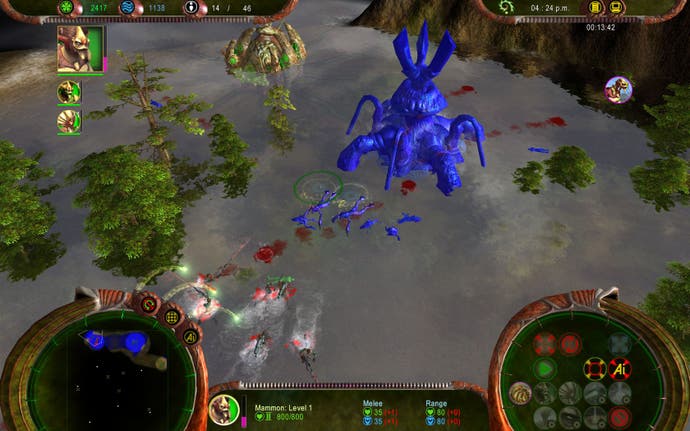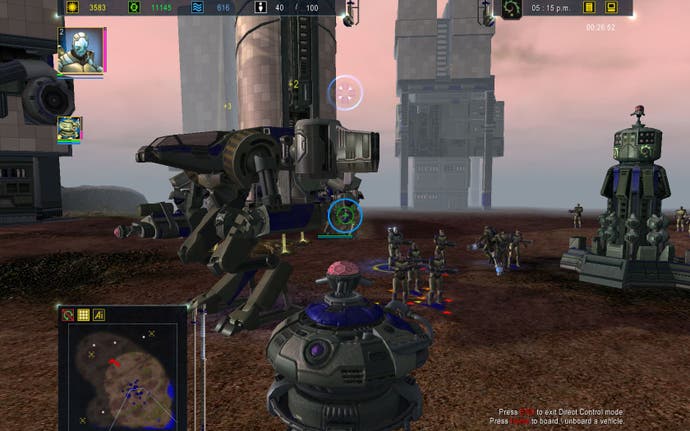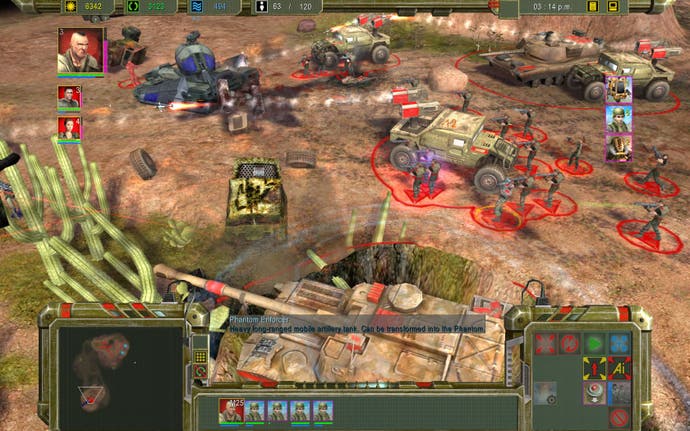Maelstrom
Bit girly?
First impressions can be a killer. Especially when that impression is, say, a really long, boring anecdote, told by someone with zero storytelling ability and a tendency to spray bits of half-chewed food over you when they speak. Poor Maelstrom doesn't quite know how to behave in polite company, and as such it's going to find it very hard to make friends. That's a shame, because underneath its crooked yellow teeth, shabby posture and tendency to drone on a bit, it's got a good heart. It'd probably make you very happy, if only you were able to get over those flecks of spittle at the corners of its mouth.
It's an RTS, very much in the Command & Conquer mould, that really does introduce itself in stunningly cretinous fashion. Its single-player campaign kicks off with long, laughably tedious in-engine cut-scenes starring stupid-looking people with stupid-sounding voices, then forces you through several hours of playing with the single most hackneyed RTS faction ever put to screen. The Remnant have absolutely nothing going for them, not a lone spark of inspiration or charm, and picking them to open the game and guide most of the story is like the Beatles using Ringo as frontman, George Lucas casting Hayden Christiansen as Han Solo or a Sonic the Hedgehog game starring Shadow. Hmm.

It's an enormous misstep. So very many people will give up just a few missions in and abandon Maelstrom in disgust. Perhaps it deserves it, in a way. If, as it appears, that woefully uninteresting faction is there because of a misguided attempt to make the new offering from a developer who made Perimeter, perhaps the oddest RTS of recent times, shamelessly commercial, then Maelstrom should be punished for it.
Punished, but not damned. Key to enjoying it is simply skipping the campaign. It'll only make you hate the game. Even once the other two vastly more compelling factions are opened up, the storyline remains an uninteresting muddle of hamfisted exposition and lousy voice acting. But the same was true, though not as pitifully, of the original Dawn of War, and that shone through as a fine RTS nonetheless. Maelstrom almost manages the same trick by dint of its other two factions - the roboty Ascension and alien Ha-Genti are both full of playful ideas. Jump straight to skirmish or multiplayer mode with either of them, and it's a different game entirely. You get to play with them as the engines of destruction they're supposed to be, not the hamstrung form they take in the storyline missions. Even the bells and whistles tacked onto the UI when you play as them are far better than the Remnants - they look more fun, and they play more fun. Their units are still blighted by irritatingly repetitive, sometimes nonsensical voice samples when you click on them and preposterous idle animations that look like they're having either a fit or the rapture, but they ask something different of you.
The aliens especially - you know when they're doing well, because half the map's covered in water, with giant, rectum-like hives sticking out of it. The water's not purely a style element either - it's the aliens' defence system, slowing down foes and buffing their own troops. Around each hive is a ring of different sized eggs (so long as you've had your eye on the ball enough to build them frequently); each one of these eggs will spawn a wonderfully ugly monster of your choice when you activate it. Underneath the Giger riff, this building mechanic isn't vastly different to unit construction in any other build'n'bash RTS, but it gives real theme to the race, and a tiny green oval suddenly turning into what looks like a 20-foot-tall hand just when your enemy thinks he's wiped you out is a particularly geeky treat.

The Ascension, meanwhile, are where the most ideas from Perimeter remain. Their approach is one of economy - a more limited unit and building count, but most of their stuff can be adapted to other purposes as required. A bomber plane transforming into a 20-foot robot and mowing down all your enemy's infantry is an even geekier treat than the aliens' Alien-ness. The Ascension are a difficult but interesting race to play as, a world away from the crushing obviousness of the Remnants. Each of their few buildings reduces down to a vehicle, so you can push your front-line ever-forwards, but such emphasis on adaptability rather than weight of numbers means the speed of fights and the fiddliness of getting everything transformed into the most appropriate form in hurry can result in a wipeout if you're not paying unblinking attention.
Despite the delight these two races will inspire in any red-blooded, bespectacled male, fundamental problems with the game prevent it from ever taking you to giddy stratospheres. The AI and pathfinding are really sloppy - never to game-breaking point, but frustratingly so. Troops that won't start firing autonomously unless enemies are right next to them, tanks that won't move until the tank in front of it is manually shooed out the way, men spinning in circles a couple of times until they've calculated the right way to go, that sort of thing. There are interface annoyances too, such as a bizarre approach to unit grouping that restricts how many men you can select at once. Well, unless you click a special button that turns everything selected into one squad, which is treated as a single unit you can then combine with nine other units, at which point you hit the ceiling again, have to combine them into one and repeat. There's clearly reason to it - if all your snipers are one entity, for instance, they're a lot easier to usher around and saves some of the endless pressing of Ctrl+ number key - but it also smacks of being a lame excuse to not tweak a fixed-size interface so it can adapt to displaying more than one row of unit icons. And the infuriating bug that means unit groupings I've created are disbanded every time a mid-level cut-scene kicks in makes me want to score this 2/10, just out of spite.

It's worth much more than that, though. More of it works than doesn't work - its inadequacies mean shabbiness, not failure. Most of its problems are born from an internal conflict between clinical ordinariness and gleeful experimentation; its decision to pursue both means that while neither one has the polish it deserves, its standalone battles offer an enjoyably odd time. Surviving genuinely intact from the schizophrenia are its environments. They're everything the otherwise far mightier Supreme Commander's are not - detailed and wildly destructible. There's token, gimmicky terraforming at builder units' disposal, occasionally useful to place a building in a previously ill-shaped area, or even to control the flow of the alien floodwater, but it's the terradeforming that really works. In the midst of a big battle, the earth ripples and furrows, trees topple, bits of rock hurtle across the map and men go splat.
It's a great playground of war - one that would be done more justice by a better game for sure, but the exaggerated entertainment value of the Ascension and Hai-Genti factions go a long towards making up for Maelstrom's shortcomings. In a just world, which this is not, there'd be a second version of Maelstrom released, with the amateurish campaign mode and the wretched Remnants removed, sold for a fiver and called Aliens Versus Transformers.

